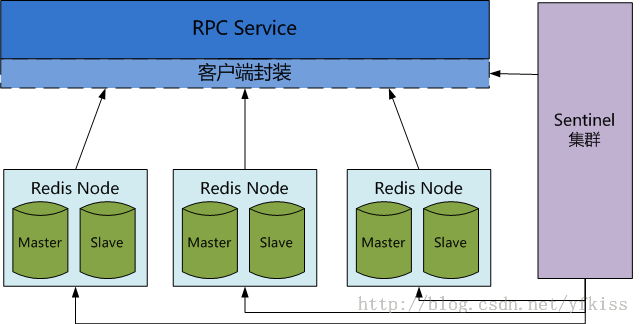Redis集群方案及实现
之前做了一个Redis的集群方案,跑了小半年,线上运行的很稳定
差不多可以跟大家分享下经验,前面写了一篇文章 数据在线服务的一些探索经验,可以做为背景阅读
应用
我们的Redis集群主要承担了以下服务:1. 实时推荐
2. 用户画像
3. 诚信分值服务
集群状况
集群峰值QPS 1W左右,RW响应时间999线在1ms左右整个集群:
1. Redis节点: 8台物理机;每台128G内存;每台机器上8个instance
2. Sentienl:3台虚拟机
集群方案

Redis Node由一组Redis Instance组成,一组Redis Instatnce可以有一个Master Instance,多个Slave Instance
Redis官方的cluster还在beta版本,参看 Redis cluster tutorial
在做调研的时候,曾经特别关注过KeepAlived+VIP 和 Twemproxy
不过最后还是决定基于Redis Sentinel实现一套,整个项目大概在1人/1个半月
整体设计
1. 数据Hash分布在不同的Redis Instatnce上2. M/S的切换采用Sentinel
3. 写:只会写master Instance,从sentinel获取当前的master Instane
4. 读:从Redis Node中基于权重选取一个Redis Instance读取,失败/超时则轮询其他Instance
5. 通过RPC服务访问,RPC server端封装了Redis客户端,客户端基于jedis开发
6. 批量写/删除:不保证事务
RedisKey
public class RedisKey implements Serializable{
private static final long serialVersionUID = 1L;
//每个业务不同的family
private String family;
private String key;
......
//物理保存在Redis上的key为经过MurmurHash之后的值
private String makeRedisHashKey(){
return String.valueOf(MurmurHash.hash64(makeRedisKeyString()));
}
//ReidsKey由family.key组成
private String makeRedisKeyString(){
return family +":"+ key;
}
//返回用户的经过Hash之后RedisKey
public String getRedisKey(){
return makeRedisHashKey();
}
.....
}
Family的存在时为了避免多个业务key冲突,给每个业务定义自己独立的Faimily
出于性能考虑,参考Redis存储设计,实际保存在Redis上的key为经过hash之后的值
接口
目前支持的接口包括:public interface RedisUseInterface{
/**
* 通过RedisKey获取value
*
* @param redisKey
* redis中的key
* @return
* 成功返回value,查询不到返回NULL
*/
public String get(final RedisKey redisKey) throws Exception;
/**
* 插入<k,v>数据到Redis
*
* @param redisKey
* the redis key
* @param value
* the redis value
* @return
* 成功返回"OK",插入失败返回NULL
*/
public String set(final RedisKey redisKey, final String value) throws Exception;
/**
* 批量写入数据到Redis
*
* @param redisKeys
* the redis key list
* @param values
* the redis value list
* @return
* 成功返回"OK",插入失败返回NULL
*/
public String mset(final ArrayList<RedisKey> redisKeys, final ArrayList<String> values) throws Exception;
/**
* 从Redis中删除一条数据
*
* @param redisKey
* the redis key
* @return
* an integer greater than 0 if one or more keys were removed 0 if none of the specified key existed
*/
public Long del(RedisKey redisKey) throws Exception;
/**
* 从Redis中批量删除数据
*
* @param redisKey
* the redis key
* @return
* 返回成功删除的数据条数
*/
public Long del(ArrayList<RedisKey> redisKeys) throws Exception;
/**
* 插入<k,v>数据到Redis
*
* @param redisKey
* the redis key
* @param value
* the redis value
* @return
* 成功返回"OK",插入失败返回NULL
*/
public String setByte(final RedisKey redisKey, final byte[] value) throws Exception;
/**
* 插入<k,v>数据到Redis
*
* @param redisKey
* the redis key
* @param value
* the redis value
* @return
* 成功返回"OK",插入失败返回NULL
*/
public String setByte(final String redisKey, final byte[] value) throws Exception;
/**
* 通过RedisKey获取value
*
* @param redisKey
* redis中的key
* @return
* 成功返回value,查询不到返回NULL
*/
public byte[] getByte(final RedisKey redisKey) throws Exception;
/**
* 在指定key上设置超时时间
*
* @param redisKey
* the redis key
* @param seconds
* the expire seconds
* @return
* 1:success, 0:failed
*/
public Long expire(RedisKey redisKey, int seconds) throws Exception;
}
写Redis流程
1. 计算Redis Key Hash值2. 根据Hash值获取Redis Node编号
3. 从sentinel获取Redis Node的Master
4. 写数据到Redis
//获取写哪个Redis Node
int slot = getSlot(keyHash);
RedisDataNode redisNode = rdList.get(slot);
//写Master
JedisSentinelPool jp = redisNode.getSentinelPool();
Jedis je = null;
boolean success = true;
try {
je = jp.getResource();
return je.set(key, value);
} catch (Exception e) {
log.error("Maybe master is down", e);
e.printStackTrace();
success = false;
if (je != null)
jp.returnBrokenResource(je);
throw e;
} finally {
if (success && je != null) {
jp.returnResource(je);
}
}
读流程
1. 计算Redis Key Hash值2. 根据Hash值获取Redis Node编号
3. 根据权重选取一个Redis Instatnce
4. 轮询读
//获取读哪个Redis Node
int slot = getSlot(keyHash);
RedisDataNode redisNode = rdList.get(slot);
//根据权重选取一个工作Instatnce
int rn = redisNode.getWorkInstance();
//轮询
int cursor = rn;
do {
try {
JedisPool jp = redisNode.getInstance(cursor).getJp();
return getImpl(jp, key);
} catch (Exception e) {
log.error("Maybe a redis instance is down, slot : [" + slot + "]" + e);
e.printStackTrace();
cursor = (cursor + 1) % redisNode.getInstanceCount();
if(cursor == rn){
throw e;
}
}
} while (cursor != rn);
权重计算
初始化的时候,会给每个Redis Instatnce赋一个权重值weight根据权重获取Redis Instance的代码:
public int getWorkInstance() {
//没有定义weight,则完全随机选取一个redis instance
if(maxWeight == 0){
return (int) (Math.random() * RANDOM_SIZE % redisInstanceList.size());
}
//获取随机数
int rand = (int) (Math.random() * RANDOM_SIZE % maxWeight);
int sum = 0;
//选取Redis Instance
for (int i = 0; i < redisInstanceList.size(); i++) {
sum += redisInstanceList.get(i).getWeight();
if (rand < sum) {
return i;
}
}
return 0;
}